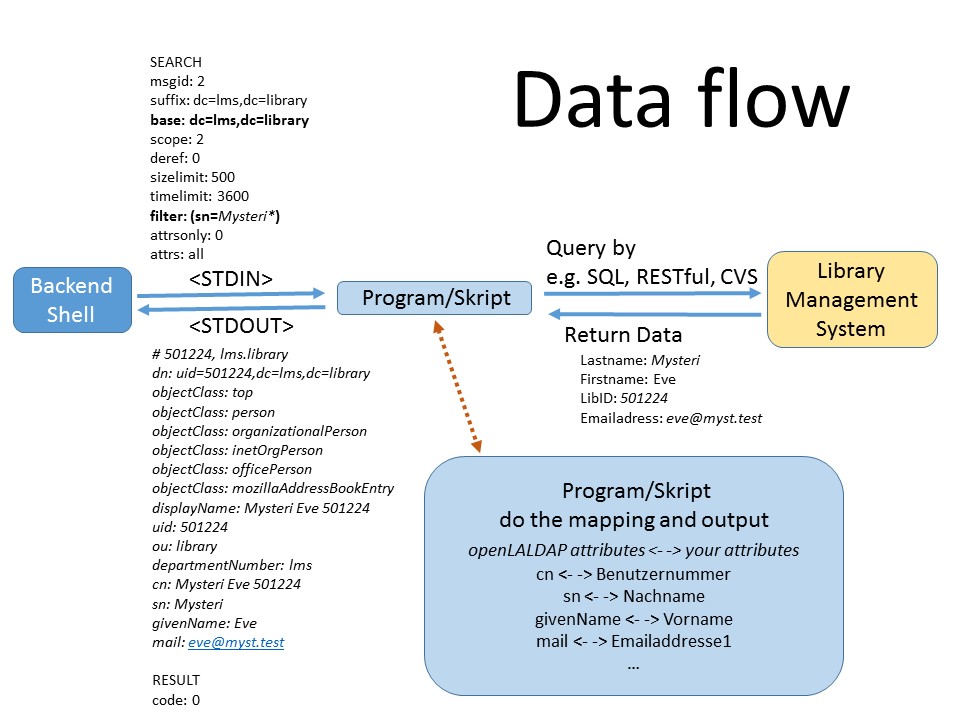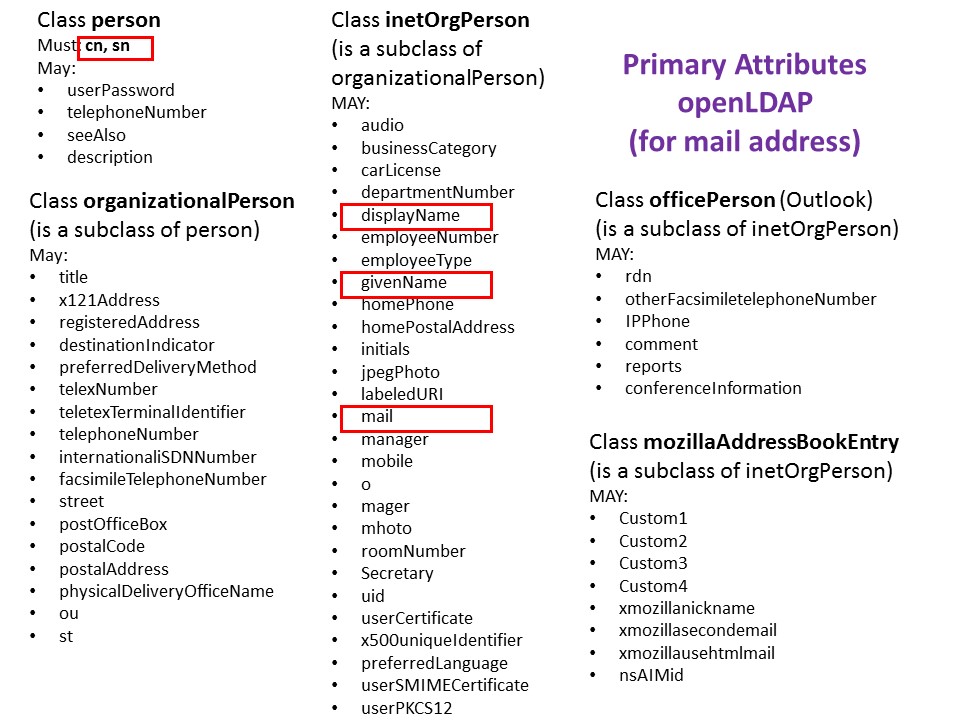The openLDAP backend 'shell' can launch any executable program, such as a native compiled C program, or a bash, or php or python script. The communication is done via the stdin and stdout channel. You can return the data in plain ASCII or, if there are any special characters within names, you can encode the data in base64. The ":": indicates that the data is base64 encoded.
normal entry: sn: Lang
base64 encoded entry: sn:: TGFuZw==
While developing I noticed that openLDAP server is quite sensitive like a mimosa. If you are doing changes - run the openLDAP server in debug mode. With google and patience you will fix any problem :)
The binary build of this demo uses the linker parameter -rpath - thus you cannot 'simply' move this openldap installation into another directory that is different to the one you entered while installation. On the other side you do not change PATH or LD_LIBRARY environment variable for running.
Example for debugging the backend shell and your program - start in debug mode 1024:
(See https://www.openldap.org/doc/admin24/guide.html)
Debugging Levels Level Keyword Description
-1 any enable all debugging
0 no debugging
1 (0x1 trace) trace function calls
2 (0x2 packets) debug packet handling
4 (0x4 args) heavy trace debugging
8 (0x8 conns) connection management
16 (0x10 BER) print out packets sent and received
32 (0x20 filter) search filter processing
64 (0x40 config) configuration processing
128 (0x80 ACL) access control list processing
256 (0x100 stats) stats log connections/operations/results
512 (0x200 stats2) stats log entries sent
1024 (0x400 shell) print communication with shell backends
2048 (0x800 parse) print entry parsing debugging
16384 (0x4000 sync) syncrepl consumer processing
32768 (0x8000 none) only messages that get logged whatever log level is set
Thus call it with: /tmp/openldap4lms/libexec/slapd -d 1024 &
then run a search test:
/tmp/openldap4lms/bin/ldapsearch -v -x -H ldap://localhost -D 'cn=query,dc=lms,dc=library' -w "clFvdTNaaV" -b 'dc=lms,dc=library' '(sn=Mysteri)'
this will output something like this:
ldap_initialize( ldap://localhost )
filter: (sn=Mysteri)
requesting: All userApplication attributes
# extended LDIF
#
# LDAPv3
# base <dc=lms,dc=library> with scope subtree
# filter: (sn=Mysteri)
# requesting: ALL
#
shell search reading line (dn: cn=501224,dc=ldap,dc=lms,dc=library)
shell search reading line (objectClass: top)
shell search reading line (objectClass: person)
shell search reading line (objectClass: organizationalPerson)
shell search reading line (objectClass: inetOrgPerson)
shell search reading line (objectClass: mozillaAddressBookEntry)
shell search reading line (objectClass: officePerson)
shell search reading line (objectClass: ndsLoginProperties)
shell search reading line (cn:: NTAxMjI0)
shell search reading line (sn:: TXlzdGVyaQ==)
shell search reading line (givenName:: RXZl)
shell search reading line (mail: eve@myst.test)
(...)
./search_library <<_EOF_
SEARCH
msgid: 2
suffix: dc=lms,dc=library
base: dc=lms,dc=library
scope: 2
deref: 0
sizelimit: 500
timelimit: 3600
filter: (&(objectClass=*)(|(cn=smith*)(mail=smith*)(sn=smith*)))
attrsonly: 0
_EOF_
- Thunderbird
- Addressbook:(&(objectClass=*)(&(|(cn=*smith*)(givenName=*smith*)(sn=*smith*)(mozillaNickname=*smith*)(mail=*smith*)(mozillaSecondEmail=*smith*)(&(description=*smith*))(o=*smith*)(ou=*smith*)(title=*smith*)(?=undefined)(?=undefined))))
- Outlook
- Addressbook: (&(|(mail=smith*)(cn=smith*)(sn=smith*)(givenName=smith*)(displayName=smith*)))
SRCH attr=cn commonName mail roleOccupant display-name displayname sn surname co organizationName o givenName legacyExchangeDN objectClass uid mailNickname title company physicalDeliveryOfficeName telephoneNumber
- To-Line: (&(objectClass=*)(|(cn=smith*)(mail=smith*)(sn=smith*)))

